
(Matthew 16:13-23)
May these words of this Peter be like a rock,
not a stumbling block!
|
|
"Who do you say
that I am?" Jesus asked. Simon Peter answered, "You
are the Messiah, the Son of the living God." And Jesus
answered, "Blessed are you, Simon son of Jonah! ... You are
Peter (petros), and on this rock (petra)
I will build my church..." Jesus then began to speak of
the rough road ahead. And Peter took him aside and rebuked him... "Get
behind me, Satan!" Jesus replied. "You are a stumbling
block..." (Matthew 16:13-23) May these words of this Peter be like a rock, |
"Wide-eyed by starlight"
Message preached February 9, 2003
Long Green Valley Church of the Brethren
Glen Arm, Maryland USA
based upon Mark
1:35, Isaiah
40:21-31,
"In
the morning, while it was still very dark, Jesus got up and went out to a
deserted place, and there he prayed" (Mark 1:35)
... Last week I asked the question, mindful of the drums of war currently
beating, "what is our greatest weapon?" One of the possibilities I
lifted up in response was "prayer." Someone came up to me afterward
and said, "if we were to put up a banner out front of our church, Iíd
vote that it say, Ďprayer is our greatest weapon.í"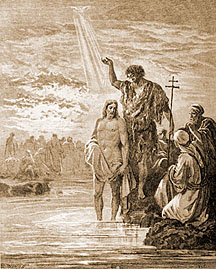
The story of Jesus, which - as the hymn sings - is our story, our song, is told by Markís gospel in a very frenetic way. It moves rapidly from scene to scene, as if there is only so much time and space to tell it. In many ways, this is the story of our lives, as we hurry from place to place, trying to accomplish so much in what little time we have, with what little energy we possess. In Jesusí story, according to Mark, we are nearing the end of the very first chapter, and already so much has happened, that we are left just a tad breathless.
John and his baptism of Jesus have been quickly left back on the banks of the Jordan river, where John is then arrested and thrown in jail. In but two verses, forty days of temptation in the wilderness pass and our Lord enters the thick and thin of his earthly ministry. He proclaims the good news of God, he calls out his disciples, he teaches in the synagogue and preaches in the countryside, he heals the sick. (take a breath) Items on his "to do" list are quickly being crossed off. Word of him spreads like wildfire, such that by the 28th verse of this gospel, it says: "At once his fame began to spread throughout the surrounding region of Galilee." It didnít just trickle out, it poured. And people came to him - more and more and more of them. A flood of need.
We almost
miss the pause that then happens in the action, for it is buried in the
immediate press of events that will all-too-quickly lead him to the cross.
"In the morning, while it was still very dark, Jesus got up and went out
to a deserted place, and there he prayed." Without that
"time-out," I donít know how the rest of the story could ever
finish. Even 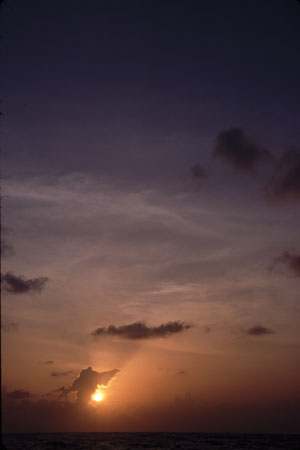 Jesus
couldnít grab moments during the day to get away. He had to rise before the
sun, tip-toe away from his slumbering followers, and find a spot to be alone.
Jesus
couldnít grab moments during the day to get away. He had to rise before the
sun, tip-toe away from his slumbering followers, and find a spot to be alone.
Now, I know all of you who are not early-risers are beginning to groan at this point in the story. The thought of getting up at that time of day is not your idea of fun. "Torture" would be a more appropriate term for it in your lexicon. "I hope Pete isnít going to call us all into an early Ďmorning watchí the Jesus way," you might be saying to yourself.
Of course, as Mark tells it, even the ĎJesus wayí didnít last very long. Those closest to him, the disciples, soon started hunting for him and found him, and the flood of need just kept rolling. From my youth, I recall an old rock song. It went, "we gotta get out of this place, if itís the last thing we ever do..." (by Eric Burdon, the Animals, midi of song) Well, thatís what Jesus then did. He packed them up and moved on to the next place, and it started all over again. Does that sound familiar, or what?
Whether you are an early-riser or a late-night-owl - or, like most folks, somewhere in the middle - seizing the opportunity at some point during the mad rush of every day to pull away for prayer is not just a goal to which you might aspire one day when youíve got it all together. Itís not merely a spiritual discipline attained by some religious elite who are obviously much closer to Jesus than the rest of us. Itís more, on a basic level, a matter of survival.
Look at the story of Jesus, as told by Mark, and we discover our Lord grabbing an early morning moment on the run. This is not a picture of some self-actualized Buddha, sitting in a pose of contemplation without a worry in the world, on the path to becoming god, having pushed away all those things that tie one to this earthly existence. The scene looks much more familiar.
As we often place Jesus on some pedestal, far out of our reach, so also we approach prayer. Tell me, when you think of prayer - especially prayer that is more than a momentary plea when in the middle of trouble, or a rote word spoken almost mindlessly at dinnertime - what comes to mind? Do you see prayer the same way you envision exercise?
I know,
there are parallels between the two, for both require discipline if we are to
get in shape physically or spiritually. However, I think making that connection
between the two can get in the way of what prayer is really all about. Letís
be honest, how many of us go through phases where we purchase the latest
equipment which we put to use for a while and then stow away in the attic? Iím
not talking exercise here, though thatís how we too often handle trying to
keep in shape phy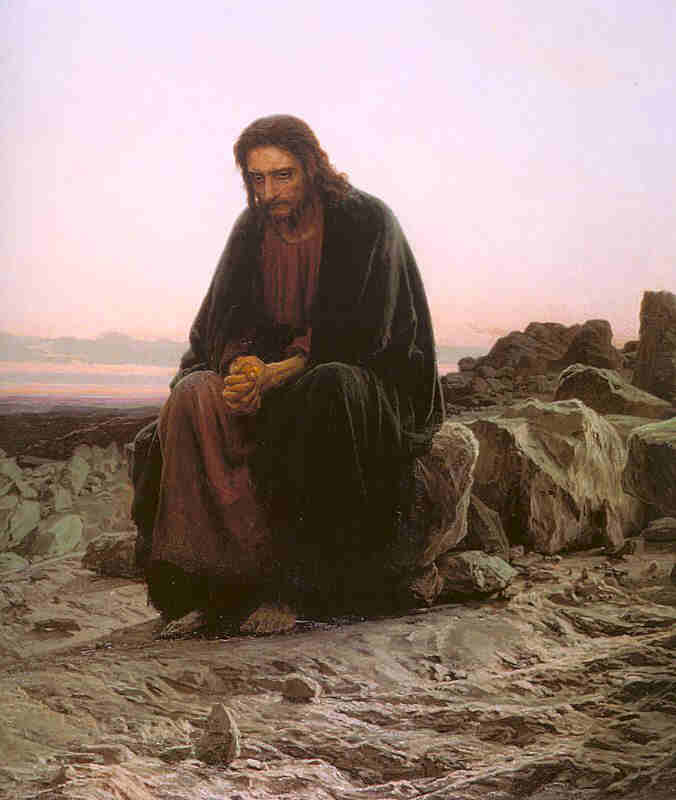 sically.
That walking machine in front of our TV at home stands as an indictment of my
laziness every time I look at it. I think I managed at least 30 minutes total in
all of January.
sically.
That walking machine in front of our TV at home stands as an indictment of my
laziness every time I look at it. I think I managed at least 30 minutes total in
all of January.
Seeing prayer in the same way becomes a constant reminder of how out-of-shape we are spiritually. When we feel guilty enough, we then go out and buy the latest book on prayer, or seek out some new (or old) technique to help us. Call it human nature. However, is that what prayer really is? Well, in a way it is. Read through this first breathless installment of Markís gospel story and we find two prayer episodes. The first is Jesusí 40 days of prayer and fasting in the wilderness immediately after his baptism. Talk about getting into shape! Who was his "coach" through that training period? (1:13) Satan. Well, it also says "the angels waited on him."
I know, Satan wasnít really his "coach," but rather his "tempter" trying to get him to choose other ways. The Spirit was his coach (1:12 - "the Spirit immediately drove him into the wilderness"). But I think we sometimes approach prayer as if it were some kind of "hellish" wilderness experience we have to endure in order to get to heaven. When that is the case, who is real coach? Now, in the second episode of prayer in Markís gospel, it says that Jesus "went out to a deserted place," words that draw us back to those 40 days alone in the wilderness. Here, however, there is a different "feel." This isnít like our Lord working at convincing himself he had to get up, put on his sweats, and get on that exercise bike. Thatís a draining thought.
I propose that prayer, like this brief verse of scripture, is less like exercise, and more like eating a meal. In fact, the practice of fasting - for instance - is intended not to be so much refraining from food as much as consciously eating at a different table. When fasting, it takes a while to make that shift - but, once made, fasting becomes feasting. Prayer, itself, is like a meal. One needs to eat in order to get through the day. Jesus himself needed his early-morning meal, his time of communion with the Father. He could not have made it through the flood of human need overwhelming him every day without this meal. It was a matter of survival.
It is a matter of survival for us as well. Of course, many of us are oblivious to how spiritually hungry we really are. It may take a bottom-of-the-barrel experience, as those in the addiction recovery movement fully understand, for us to realize that we are starving for a "higher power" ... "One day at a time" is a reminder that without daily attention to this, we donít make it. Prayer is like a meal which we need to eat in order to live.
In one of
my visits this week, I spoke with someone who hasnít had much of an appetite
lately. The refrigerator just doesnít hold anything that appeals right now.
Prayer as a "meal" may not be the best way of seeing it for this
person. Maybe a better, and more immediate, illustration would be to think of
prayer in the same way we think of breathing. You have to breathe. If youíre
not breathing, youíre a corpse. There are many "living dead" around
us, persons for whom the frenetic pace of life leaves the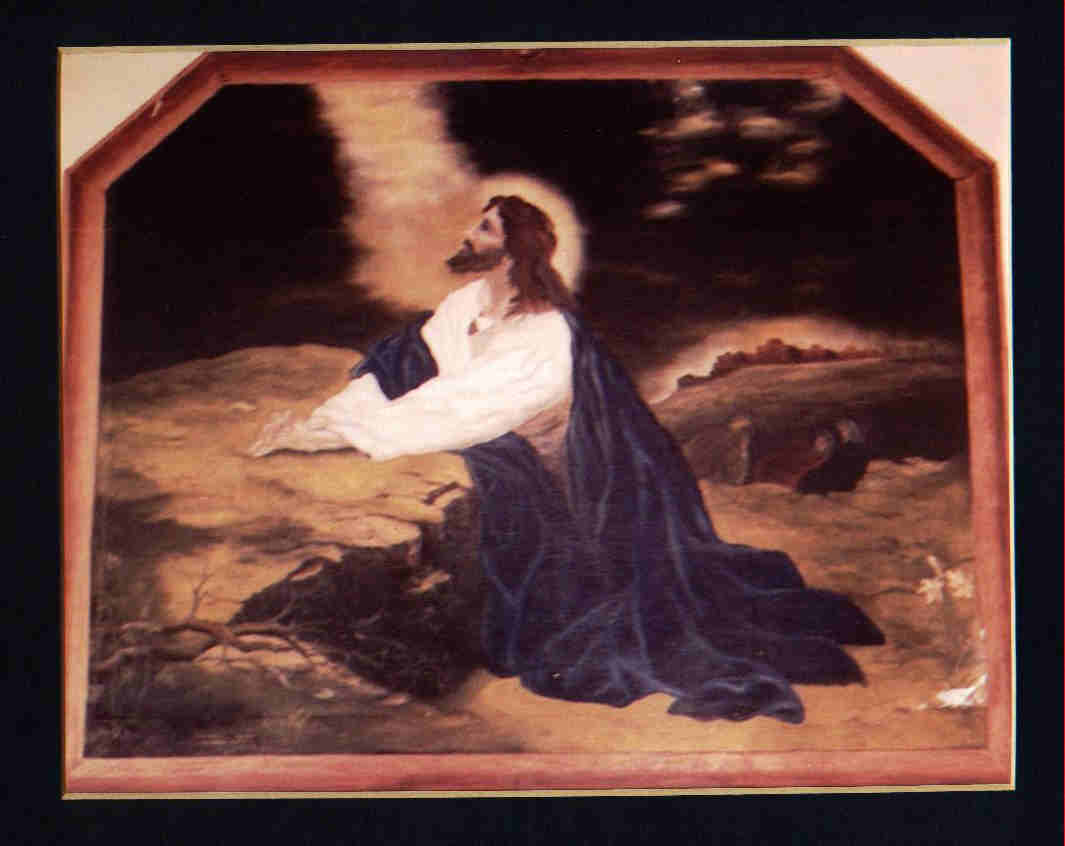 m
"breathless" spiritually. Prayer is like breathing. And like physical
breathing, it often is an unconscious effort, something we do without even
thinking about it. It makes sense (doesnít it?) that the Holy Spirit is
sometimes called the breath of God.
m
"breathless" spiritually. Prayer is like breathing. And like physical
breathing, it often is an unconscious effort, something we do without even
thinking about it. It makes sense (doesnít it?) that the Holy Spirit is
sometimes called the breath of God.
"Lift up your eyes on high and see..." (Isaiah 40:26) On the wall in front of the old sanctuary of this church, when our meetinghouse was on the other side of Long Green Rd., there was a painting of Jesus communing with God. A photo of it hangs in our entryway, above the pamphlet rack. In this picture, what is the posture of our Lordís head as is involved in this "meal" (if you will), as he prays? Is his head bowed? Are his eyes closed? No. He is looking up.
"Lift up your eyes on high and see," Isaiah said. Now, I donít wish to get into a discussion of the "proper" posture for prayer, but you know - donít you? - that we are not locked into "head bowed, eyes closed" or even "hands folded" prayer. Mind you, there is humility expressed in this posture - which is probably why this feels most comfortable to many of us, other than the fact that this is just how weíve always done it. Other ways feel foreign to us, or not very "reverent."
In truth, however, the early Christians didnít see it in quite this way. We have an inkling of this when we read the apostle Paul say, "I desire, then, that in every place the men should pray, lifting up holy hands without anger or argument" (1 Timothy 2:8). They often prayed with head raised, eyes looking upward, palms lifted. Now, Iím not making a case for us to pray in the same way, but - you know - when we teach our children the importance of paying attention in class, the first thing we tell them is not "close your eyes and bow your heads." Sometimes that works, of course. However, most teachers I know begin with all eyes upon her or him.
One doesnít eat with their mouth shut. Well, my youngest daughter does. Shut to the stuff she doesnít like, that is, which is usually anything with nutritious value. Prayer is an opening time. We open ourselves to God. We "lift up our eyes on high and see." We shift our attention to the source of our daily bread. We become ready to receive. Now, God is not just waiting for us to tell him what to do, like a heavenly waiter standing beside our table awaiting our order. If anything, prayer is just the opposite. "They that wait upon the Lord," Isaiah said, "shall renew their strength." We are open to receive - to receive sustenance, life, energy, peace, hope, whatever is the need of this day. Furthermore, we are open to receive guidance.
When a
sports team plays, those not on the field or the court wait on the side.
Sometimes they are their because they are not yet needed. Other times they are
there to catch a breath, to rest for a moment. Though they are not actually
playing at 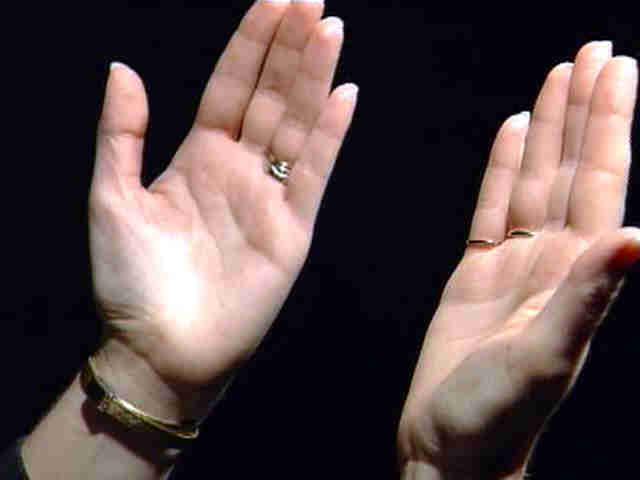 that
moment, they are very much "in" the game. They are waiting, which
doesnít mean they are oblivious to what is happening around them. The best
players are those who sit at the edge of their seat, eyes on the coach ...
waiting.
that
moment, they are very much "in" the game. They are waiting, which
doesnít mean they are oblivious to what is happening around them. The best
players are those who sit at the edge of their seat, eyes on the coach ...
waiting.
Thatís a bit like what prayer is, this "waiting on the Lord," this "lifting our eyes on high and seeing," this "getting up and going to a deserted place," this daily "eating" what we need to eat in order to survive, this moment by moment "breathing" in the Holy Spirit, the very breath of God. How often in prayer - a daily affair - are we on the edge of our seats, looking toward the coach (who isnít there to tempt us, but to lead us), waiting? That, my friends, is real prayer.
You know the promise. [I love this verse from Isaiah!] "Those who wait for the LORD shall renew their strength, they shall mount up with wings like eagles, they shall run and not be weary, they shall walk and not faint." (Isaiah 40:31)
| online resources for Isaiah 40:21-31, Mark 1:35 |
©2003 Peter L. Haynes